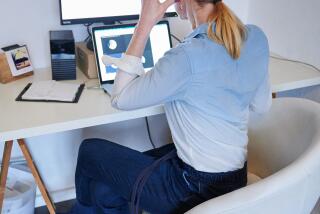Balance work and fitness
- Share via
I want my wrinkles to melt away. I want my belly as flat as the girl in the Google ads. And I certainly want my arms to look as good as Michelle Obama’s. But when forced to choose between exercise, work and family, sit-ups and push-ups fall to the bottom of my list.
Unfortunately, the downturn in the economy has most of us working more, trying to find a job, or shifting in a new career direction, giving up exercise and fitness the minute it doesn’t fit into our schedule.
Yet, with the tough economy on everyone’s mind, exercise is probably the common denominator that keeps people sane: employers, employees, service providers, clients. Some people are taking extraordinary steps to preserve that outlet.
Lifestyle experts say some simple changes can help you balance work and fitness.
Create new habits: Marta Montenegro, editor in chief of SOBeFiT Magazine, says people often are too ambitious in their fitness goals.
She started out small, making one change at a time. Whenever she feels stressed, she takes a 10-minute walk around the office or her neighborhood.
To create a habit of eating a more healthful diet, start with breakfast. Or fill your desk drawer, purse and car with nutritious snacks. It’s easy to give excuses about why you didn’t exercise or eat right.
Get moving: Walking and stretching are the easiest ways to cram exercise into a busy schedule. Both are something you can do with your spouse, friends or children.
Donna Marie Seffer, a school teacher, wears a pedometer to work every day and aims for 5,000 steps. While teaching, she walks around the classroom. During breaks, she walks the through the halls. When she gets home she walks around the block.
Take advantage of employer wellness programs: More companies are embracing the wellness trend, realizing it’s less expensive to prevent rather than treat most medical conditions. Even as employers cut benefits, a growing number are offering on-site yoga classes or weight loss programs -- some even offering incentives to participate.
Learn to relax: David Posen, a stress-management expert, says in his “Little Book of Stress Relief,” that unlike the stress reaction, which is involuntary and triggers automatically, the relaxation response has to be brought forth voluntarily and intentionally.
Jodi Cross, who works from home as a director of a women’s organization, starts her day triggering the relaxation response by reading for 30 minutes by a pond in her backyard. She alternates with walking for 45 minutes around the neighborhood.
Stop sacrificing sleep: Karen Koffler is a busy working mom. Koffler often gets up early and rides her bike to work. But she also makes sure she goes to bed early, tucking herself in by 9 p.m. Koffler believes adults should get seven to 10 hours of sleep a night.
Consider fitness part of your job description: Exercise helps you take a global view of a situation or conflict. It can spur creativity and even help you find solutions that wouldn’t occur to you when you’re in front of a computer.
With the downturn, publicist Tadd Schwartz says clients want more time. Yet, he’s making time to run, putting his running shoes next to his bed to ensure he uses them each morning instead of gravitating toward his computer.
Check out the deals: The upside of recession is that fitness professionals and health clubs are responding to new budgets, offering discounts and showing more willingness to bargain.
More to Read
The biggest entertainment stories
Get our big stories about Hollywood, film, television, music, arts, culture and more right in your inbox as soon as they publish.
You may occasionally receive promotional content from the Los Angeles Times.










